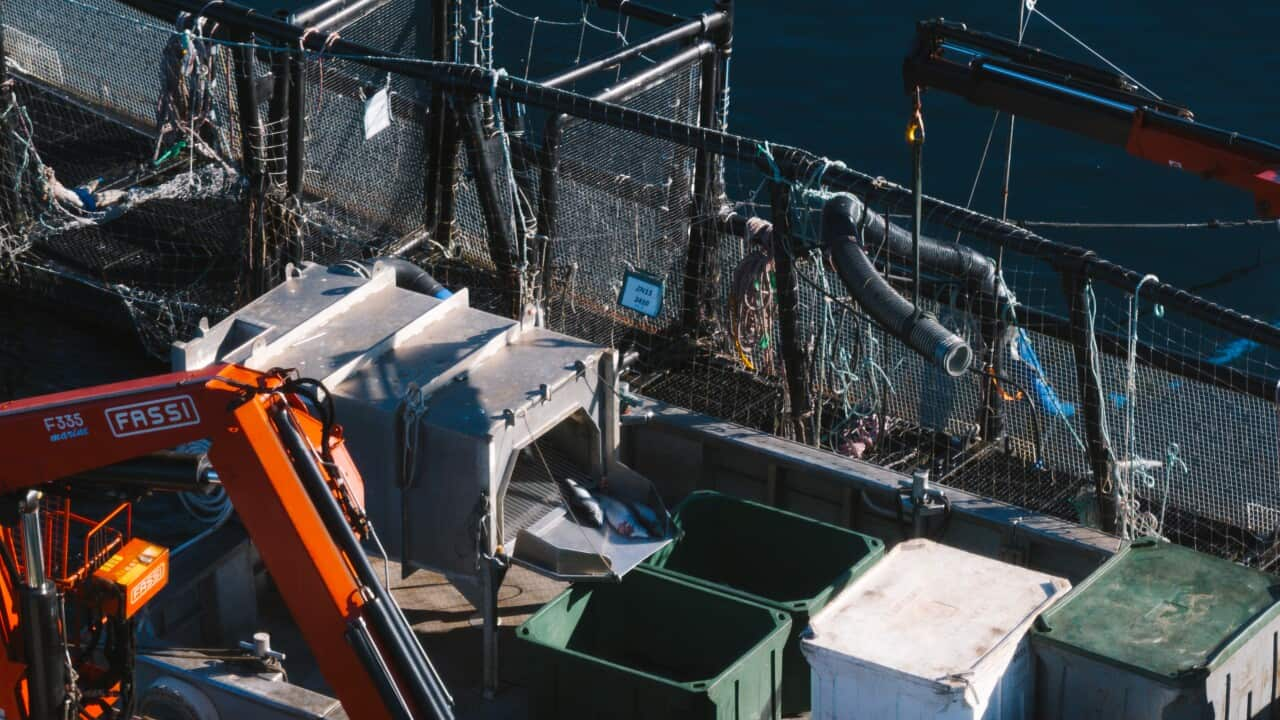Marine life along South Australia's coastline is dying, leaving locals concerned and saying they’ve never seen anything like it.
This weekend, thousands of cockles, or pipis, washed up dead at Goolwa Beach, a popular holiday destination south of Adelaide.
Barry Brown, deputy chair of RecFish SA, a peak body for recreational fishers, said: "This isn't just impacting the pipis here. It's killing off all types of fish."
"We're seeing things like sea horses dying, banjo rays, flathead, quite obscure fish coming off the reefs.
"This is very widespread around South Australia. That's a great concern."
Authorities are investigating whether the deaths are connected to an algal bloom last month, which was identified as the cause of a mass fish kill from Waitpinga to Basham Beach in the Fleurieu Peninsula, impacting a wide variety of marine and coastal wildlife.

A dead penguin was spotted lying on Goolwa Beach. Source: SBS News
He said over the weekend he cancelled dive tours due to the "murky brown" water, but he went for a dive on Sunday to check the state of the marine life there and was shocked at what he saw.
"It was very disheartening. When we first dropped below the surface, pretty much straight away on some weed was a blue-ringed octopus dead," Macdonald said.
"I would have seen about 20-30 octopus without even looking that were dead within a 20 metre radius.
"Fish like goldfish, snook, Tommy Ruff … there were dead starfish, dead crabs, dead sea cucumbers."

Dozens of dead blue-ringed octopuses have been photographed at the Edithburgh Jetty dive site. Credit: Paul Macdonald
"People come from all around Australia and the world to dive here and so to see it devastated is heartbreaking," he said.
"Nowhere in any of my diving have I seen anything quite so bad, there was almost no life."

Divers have reported a wide variety of fish species lying dead underwater. Credit: Paul Macdonald
Warming waters
Last month, hundreds of sea creatures washed up dead due to an outbreak of Karenia mikimotoi algae, believed to be caused by a marine heat wave and unusually still waters.
South Australia's Environmental Protection Agency (EPA) said Karenia mikimotoi is known to impact fish gills and is toxic to both fish and invertebrates.
Algae blooms of this type have caused mass fish and shellfish death events in Japan, New Zealand and South Australia's Coffin Bay, the EPA says.
The environmental watchdog said it expects the algae to dissipate naturally over time.
The state's Department of Primary Industries and Regions (PIRSA) said it is "too early to confirm if there are any links" between this weekend's event with last month's "large-scale fish kill".
"The department … has commenced investigations into the event with cockle and water samples collected for testing," a PIRSA spokesperson said in a statement on Monday.

RecFish SA said it has mobilised members and citizen scientists to investigate the causes of the recent fish kills. Credit: Recfish SA
"I've heard of algal blooms, but nothing like the devastation that we've had with this one," he said.
"My [diving] log book goes back 35 years … recording the temperature of the dives and looking at the same similar dates through time, the water … in the middle of summer at Edithburgh is a couple of degrees warmer than it was, say, 20-25 years ago."
Calls for urgent investigations
Goolwa Beach, the site of this week's mass death event, is known for its cockles, which are a popular food source, bait and fish stock.
Brown said RecFish SA is concerned work isn't being done fast enough to identify the cause of the deaths.
He's demanding urgent independent testing.
"They need to be down on the ground collecting more data more quickly, the turnaround time is the key, finding out what's the source of this, is it an algal bloom or is it something else?" he said.
"We're talking very important fisheries and recreational fishing is a very valuable contributor to the South Australian economy."

Cockles are an important part of South Australia's fishing economy. Source: SBS News
The outbreak is also causing allergy and flu-like symptoms in humans.
PIRSA is also investigating reports of dead fish washing up on nearby Kangaroo Island, confirming "low levels of Karenia mikimotoi" algae there.



